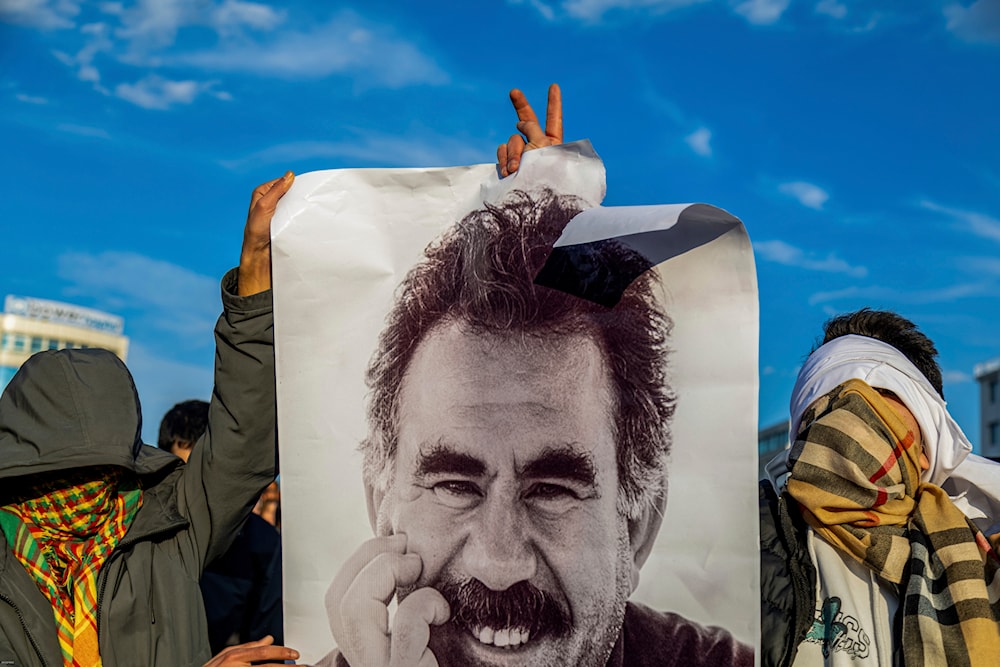Erdogan ally demands disarmament of PKK-affiliated groups
A key Erdogan ally demands the full disarmament of all PKK-linked groups, including the SDF and YPG, after Öcalan’s call for peace, asserting that exemptions contradict the leadership.
-

Youngsters hold a photograph of the jailed leader of the rebel Kurdistan Workers' Party, or PKK, Abdullah Ocalan, in Diyarbakir, Turkiye, on Thursday, February 27, 2025. (AP)
A close ally of Turkish President Recep Tayyip Erdogan insisted on Sunday that all groups linked to the Kurdistan Workers' Party (PKK) must also lay down their arms as part of a landmark ceasefire agreement with Ankara.
Last month, Abdullah Öcalan, the imprisoned leader of the PKK, urged his group to dissolve and end its over four-decade-long armed conflict against Turkiye. However, Ankara demanded that all PKK fighters be disarmed wherever they are, including those within the US-backed Syrian Democratic Forces (SDF), whose core consists of the Kurdish People’s Protection Units (YPG).
While the SDF leadership welcomed Öcalan’s February 27 call for the PKK to disband, they stated that it did not apply to their forces.
"The PKK terrorist organization and its affiliated groups must immediately and without preconditions lay down their weapons," declared Devlet Bahçeli, leader of the hardline nationalist MHP party.
Bahçeli, regarded as a key figure behind the ongoing peace discussions between Ankara and the PKK, previously proposed an unexpected reconciliation if Öcalan denounced violence.
"The fact that the YPG and other similar terrorist groups claim to be exempt from this call... is completely contradictory to the leadership of the organization," Bahçeli emphasized in a statement.
Following Öcalan’s appeal, the PKK declared a ceasefire, stating that "none of our forces will carry out any armed operation unless they are attacked."
The wider scope
Since 2016, Turkiye has conducted three major military operations in northern Syria, targeting PKK elements it considers a strategic threat along its southern border.
Recognized as a terrorist organization by Turkiye, the United States, and the European Union, the PKK has waged an insurgency since 1984, originally seeking to establish an independent Kurdish state.
Efforts to end the violence—which has claimed over 40,000 lives—have been made since Öcalan’s imprisonment in 1999, but past attempts have failed to bring lasting peace.
The call to dissolve the PKK could weaken the political leverage of Kurdish groups in Turkiye and Syria, as it formed a significant strategic force in the region at a time when Ankara has been intensifying its military operations on Kurdish groups in Syria and Turkey.
Tensions between SDF and Turkiye escalated further when Turkish drones targeted their positions in al-Hasakah on February 26, as Ankara vows to continue military operations against the Syria Democratic Forces, which it deems an extension of the Kurdistan Workers' Party.
Turkish police arrested 282 members of the PKK in police raids over five days, according to an Interior Minister Ali Yerlikaya statement on February 18, as Ankara intensified its efforts to remove elected pro-Kurdish mayors and a crackdown on the Kurdish party aiming to end the 40-year-long conflict between the two sides.

 3 Min Read
3 Min Read










